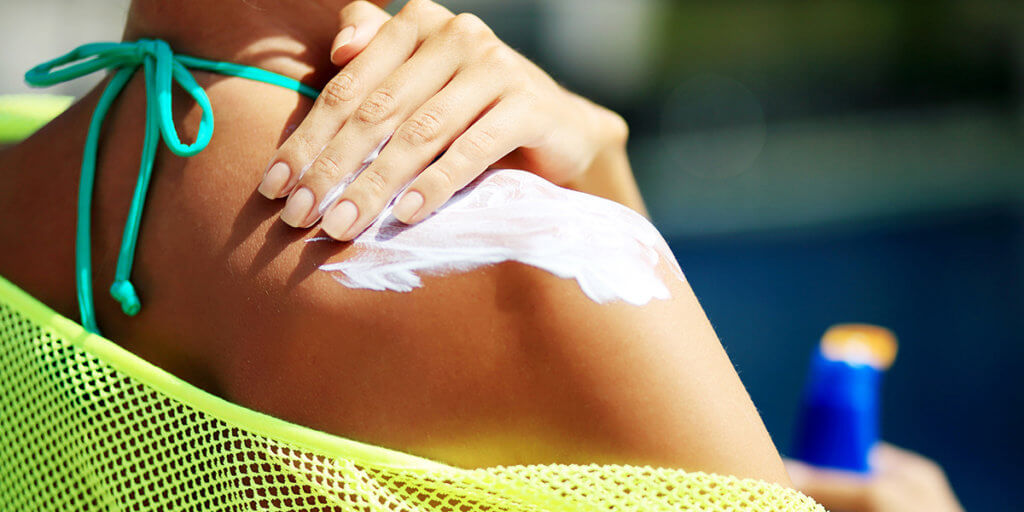
May is Skin Cancer Awareness Month! We encourage you to take the opportunity to learn more about sun damage, skin cancer, and skin protection. Protection from the sun’s rays is essential to preventing skin cancer. Anyone can get skin cancer regardless of age, gender, or race. In fact, about 1 in 5 Americans will develop skin cancer in their lifetime. About 90% of non-melanoma skin cancers and 86% of melanomas are associated with exposure to ultraviolet rays (UVA/UVB) from the sun. Learn how to protect yourself and others from skin cancer.
Sunscreen
Everyone needs sunscreen! The sun emits harmful UV rays year-round – even on cloudy days. Snow, sand, and water actually increase the need for sunscreen because they reflect the sun’s rays. Sunscreen works like a shield; it sits on the surface on your skin, deflecting the sun’s rays. Remember to apply enough sunscreen to cover ALL exposed skin. Most adults need about 1 ounce to cover their bodies entirely. Don’t forget to include the tops of your feet, neck, ears, and the top of your head. Make sure you wait until your skin is dry to apply sunscreen, or else it can wash off, and apply 15 minutes before going outdoors. Remember – skin cancer can also form on your lips. Apply a lip balm or lipstick that contains sunscreen with an SPF of 30 or higher.
What Type of Sunscreen to Use
It can be overwhelming to decide which sunscreen is best for you. The truth is, the kind of sunscreen you use is a matter of personal choice and can vary depending on the area of the body you want to be protected.
You can get sunscreens in several different forms, including:
- Creams: these are best for dry skin and the face.
- Gels: suitable for hairy areas, like the scalp or male chest.
- Sticks: ideal for use around the eyes.
- Sprays: Parents sometimes prefer these because they are easier to apply to children. Do not inhale these products or apply near heat or open flame.
There are also sunscreens explicitly made for sensitive skin and babies. Some sunscreens products are available in combination with moisturizers and cosmetics. But while they are convenient, they also need to be reapplied to achieve the best sun protection.
Choosing the Right SPF
SPF – or Sun Protection Factor- is a measure of a sunscreen’s ability to prevent UVB from damaging the skin.Dermatologists recommend using a sunscreen with an SPF of at least 30, blocking 97% of the sun’s UVB rays. Sunscreens with higher SPF’s can block the sun’s UV rays slightly more, but no sunscreen can block 100% of the sun’s rays. It is also important to know that sunscreens with higher SPF’s still need to be reapplied every two hours, the same as sunscreens with lower SPF’s.
Common Sunscreen Myths
If it’s cold or cloudy outside, you don’t need sunscreen.
Up to 40% of the sun’s UVB rays reach the earth on a completely cloudy day. This is a misperception that often leads to severe sunburns from people spending all day outdoors with no protection.
People with darker skin don’t need sunscreen.
Some people believe that those with more melanin in their skin do not need sunscreen. This is because melanin acts to diffuse UVB rays and can protect against sunburns to an extent. However, people with darker skin should still use a full spectrum sunscreen.
All sunscreen is the same.
There are a variety of ingredients in sunscreens that may protect against different levels of sun exposure. Active ingredients like titanium dioxide and zinc oxide are often used to filter out UVA and UVB rays. All these ingredients block the sun in different ways. It is important to use a full spectrum sunscreen because it will protect your skin against the broadest range of UV light.
Sunscreen is crucial to healthy skin, especially when spending a lot of time outdoors. Whether you have sensitive skin, darker skin, or dry skin, everyone needs sunscreen protection. With the summer months just around the corner, it’s essential to find the right sunscreen for you. If you have questions about skin cancer and how to protect your skin, or if you would like to be seen by a dermatologist, our Concierge Care Coordinator can connect you with our Community Care Dermatology office. Call (518) 782-3800 or visit their website.
Sources
https://www.aad.org/media/stats/prevention-and-care/sunscreen-faqs
https://www.skincancer.org/prevention/sun-protection/prevention-guidelines
https://www.skincancer.org/prevention/sun-protection/sunscreen
